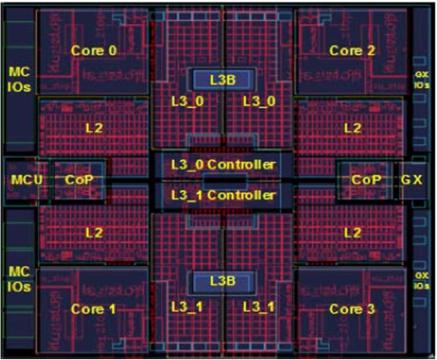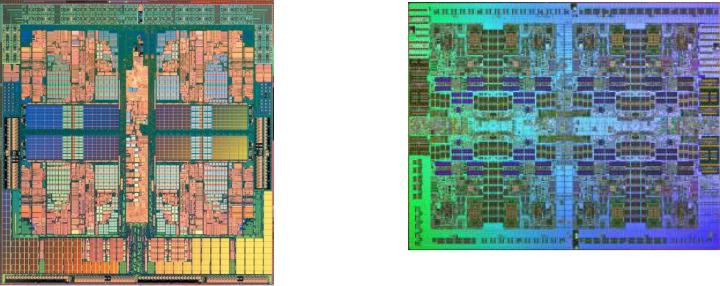
mips_info / lecture_1
.pdf
IBM 360: A General Purpose Register
(GPR) Machine
•Processor State
–16 General Purpose 32 bit Registers
•may be used as index and base register
•Register 0 has some special properties
–4 Floating Point 64 bit Registers
–A Program Status Word (PSW)
•PC, Condition codes, Control flags
•A 32 bit machine with 24 bit addresses
–But no instruction contains a 24 bit address!
•Data Formats
–8 bit bytes, 16 bit half words, 32 bit words, 64 bit double words
The IBM 360 is why bytes are 8 bits long today!
31
IBM 360: Initial Implementations
|
Model 30 |
. . . |
Model 70 |
Storage |
8K - 64 KB |
|
256K - 512 KB |
Datapath |
8-bit |
|
64-bit |
Circuit Delay |
30 nsec/level |
|
5 nsec/level |
Local Store |
Main Store |
|
Transistor Registers |
Control Store |
Read only 1 sec |
Conventional circuits |
|
IBM 360 instruction set architecture (ISA) completely hid the underlying technological differences between various models.
Milestone: The first true ISA designed as portable hardware-software interface!
32
IBM 360: Initial Implementations
|
Model 30 |
. . . |
Model 70 |
Storage |
8K - 64 KB |
|
256K - 512 KB |
Datapath |
8-bit |
|
64-bit |
Circuit Delay |
30 nsec/level |
|
5 nsec/level |
Local Store |
Main Store |
|
Transistor Registers |
Control Store |
Read only 1 sec |
Conventional circuits |
|
IBM 360 instruction set architecture (ISA) completely hid the underlying technological differences between various models.
Milestone: The first true ISA designed as portable hardware-software interface!
With minor modifications it still survives today!
33

IBM 360: 47 years later… The zSeries z11 Microprocessor
[ IBM, Kevin Shum, HotChips, 2010]
Image Credit: IBM
Courtesy of International Business
Machines Corporation, © International
Business Machines Corporation.
•5.2 GHz in IBM 45nm PD SOI CMOS technology
•1.4 billion transistors in 512 mm2
•64 bit virtual addressing
–original S/360 was 24 bit, and S/370 was 31 bit extension
•Quad core design
•Three issue out of order superscalar pipeline
•Out of order memory accesses
•Redundant datapaths
–every instruction performed in two parallel datapaths and results compared
•64KB L1 I cache, 128KB L1 D cache on chip
•1.5MB private L2 unified cache per core, on chip
•On Chip 24MB eDRAM L3 cache
•Scales to 96 core multiprocessor with 768MB of shared L4 eDRAM
34

Same Architecture
Different Microarchitecture
AMD Phenom X4 |
Intel Atom |
||
• |
X86 Instruction Set |
• |
X86 Instruction Set |
• |
Quad Core |
• |
Single Core |
• |
125W |
• |
2W |
• |
Decode 3 Instructions/Cycle/Core |
• |
Decode 2 Instructions/Cycle/Core |
• 64KB L1 I Cache, 64KB L1 D Cache |
• 32KB L1 I Cache, 24KB L1 D Cache |
||
• |
512KB L2 Cache |
• |
512KB L2 Cache |
• |
Out of order |
• |
In order |
• |
2.6GHz |
• |
1.6GHz |
Image Credit: Intel
35
Image Credit: AMD

Different Architecture
Different Microarchitecture
AMD Phenom X4 |
IBM POWER7 |
||
• |
X86 Instruction Set |
• |
Power Instruction Set |
• |
Quad Core |
• |
Eight Core |
• |
125W |
• |
200W |
• |
Decode 3 Instructions/Cycle/Core |
• |
Decode 6 Instructions/Cycle/Core |
• 64KB L1 I Cache, 64KB L1 D Cache |
• 32KB L1 I Cache, 32KB L1 D Cache |
||
• |
512KB L2 Cache |
• |
256KB L2 Cache |
• |
Out of order |
• |
Out of order |
• |
2.6GHz |
• |
4.25GHz |
|
Image Credit: IBM |
36 |
Image Credit: AMD |
Courtesy of International Business Machines |
|
Corporation, © International Business Machines Corporation. |
|
Where Do Operands Come from And Where Do Results Go?
37

Where Do Operands Come from And Where Do Results Go?
ALU
38

Where Do Operands Come from And Where Do Results Go?
ALU
…
Memory
39

Where Do Operands Come from And Where Do Results Go?
…
Processor
ALU
…
Memory
40
